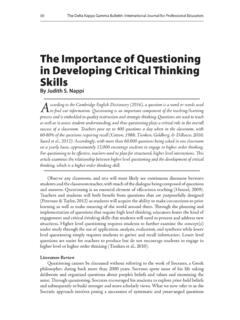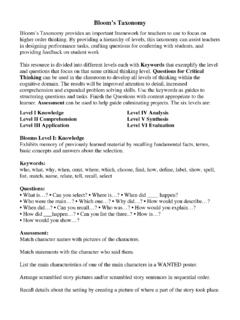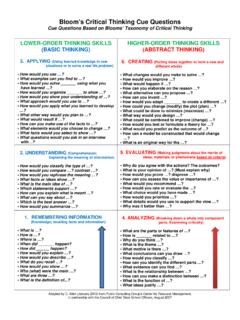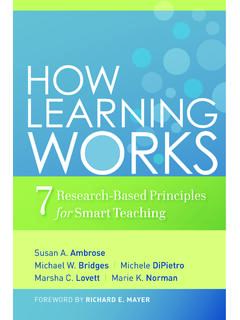Transcription of Cognitive Domain Questions
1 Cognitive Domain Questions Knowledge ComprehensionApplication AnalysisSynthesisEvaluationAbility to recall information Ability to interpret information Ability to apply information in a new situation Ability to break down information and show relationships Ability to bring together information to solve a problem Making judgments based on criteria Verbs: Verbs:Verbs:Verbs:Verbs:Verbs.
2 Remember summarizeApplyDiagramCategoriseAppraiseM emorize compareAdaptDifferentiateCombineAssessRe cognize contrastChooseCalculateComposeChooseReca ll distinguishDemonstrateDiscriminate DesignJudgeidentify
3 EstimateIllustrateCompareFormulatePredic tdefine extendConstructContrastManageRatedescrib e classifysimulateSelectReorganizeSupportl ist paraphraseExplaincreateJustifyexamine
4 LocateEvaluateQuestions: Questions : Questions : Questions : Questions : QuestionsWhat are the steps involved in? How is it related to? Would this concept work What are the parts or features What would you predict/infer Do you agree What are the three main points of?
5 How is it an example of? Is this argument supported by the data? How yould you What ideas can you add What do you think about? What qualitiesdifferentiate? Can you illustrate how this How or contrast with ..? How would you design a new ..? What is the most Describe in your own words What would happen What evidence can you give What might happen if you Which of these has a higher priority?
6 What themes do you see? What was hismotive? How turned out How sould you decide What are the three main principles behind? Why have thesechanges occurred? What solutions would you suggest What criteria would you use What advice would you
7 Which option would be the most effective? This chart is an adaptation of materials found in Benjami S. Bloom, ed. taxonomy of Educational Objectives, Handbook I: Cognitive Domain (New York, Longman, 1956). For a similar summary of affective Domain Questions , see David R. Krathwohl, et al., taxonomy of Educational Objectives, Handbook II: Affective Domain (New York, Longman, 1964). Socratic Questioning Prompts Seek Clarification Initial Questions Probe Assumption Probe Reasons and Evidence Probe Origins or Sources Probe Implications or consequences Probe Viewpoints or Perspectives What do you mean How can we find out?
8 What are you assuming? Can yo give an example? Where did you get this idea? What are youy implying by that? How would other groups respond? What is your main point? What does this question assume? What could we assume instead? Can you explain your reason for this? Have you been influence in this by the media? What effect would that have? How would you answer the objection that >>> makes? How does it relate Would .. Have put it differently? You seem to be Do I understand you correctly? Are those reasons adequate? What casued you to feel this way?
9 What is an alternative Can yousee this in another way? Can you put it another way? Can we break this question down at all? How do you justify taking this for granted? Do you have any evidence for that? What might underlie your reasoning here? If this is the case, what else must be true? What would someone who disagrees say? What do you think the main issue is here? Does this question lead to other Questions ? Is this always the case? How can we find out if that is true? Let me see if I understand you. Do you What assumptions do you think hold here?
10 Can you summarize in your own words? Is that what you mean? Can you give me an example?






